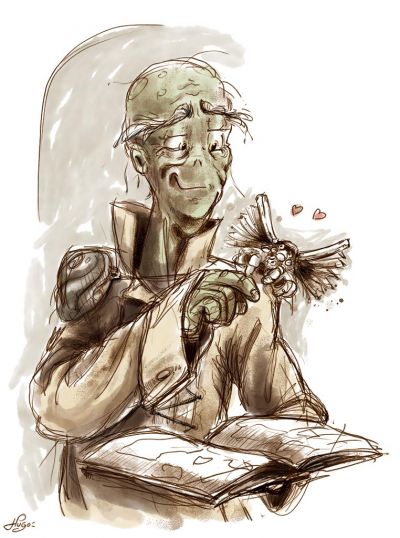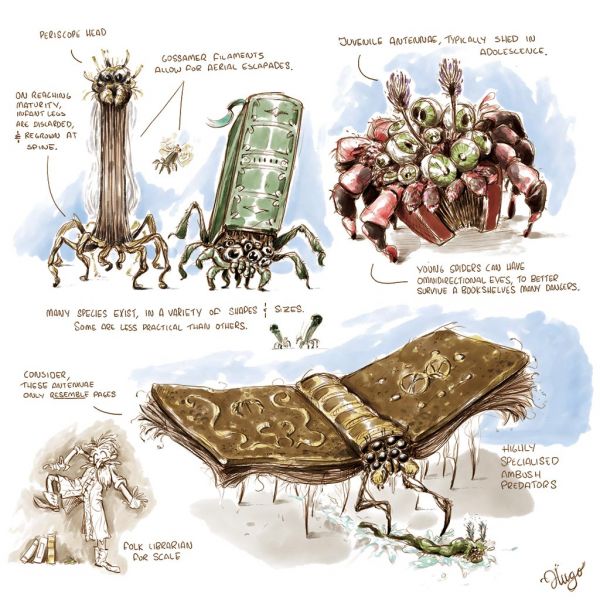Difference between revisions of "BookSpiders"
ScruffyHugo (talk | contribs) |
ScruffyHugo (talk | contribs) |
||
| (17 intermediate revisions by the same user not shown) | |||
| Line 1: | Line 1: | ||
[[File:2021_10_05_AcademicAllies_01_Sketch.jpg|thumb|400px|border|left|Book spiders are long-lived, and consequently, Slender librarians are prone to forming strong attachments. Plus they help to keep bugs out of one's tea.]] | [[File:2021_10_05_AcademicAllies_01_Sketch.jpg|thumb|400px|border|left|Book spiders are long-lived, and consequently, Slender librarians are prone to forming strong attachments. Plus they help to keep bugs out of one's tea.]] | ||
| − | |||
| − | |||
The Great Library of [[Motometro]] is so ancient and expansive it has become host to more than [[Slenders|Slender]] librarians and the occasional visitor wandering its aisles. It also maintains a highly specialised array of insects that have evolved to live among the shelves. The most prominent among them being the [[Book Spiders|Book Spider]], and its preferred prey, the [[Book Spider|Paper slug]]. | The Great Library of [[Motometro]] is so ancient and expansive it has become host to more than [[Slenders|Slender]] librarians and the occasional visitor wandering its aisles. It also maintains a highly specialised array of insects that have evolved to live among the shelves. The most prominent among them being the [[Book Spiders|Book Spider]], and its preferred prey, the [[Book Spider|Paper slug]]. | ||
| Line 8: | Line 6: | ||
===The Book Spider=== | ===The Book Spider=== | ||
| − | Liber arachnae | + | - Liber arachnae - |
| − | The [[Book Spiders|Book Spider]] begins its life as a tiny, crab-like arachnid; an awkwardly vertical, carapaced critter balancing on stout legs. It's during this time they are most fragile, and at risk of being crushed by the weight of shuffled books, or swept up by the feathery threat of a librarian's duster. As they develop, their exoskeleton grows to resemble a hardcover tome, including feelers that | + | |
| − | + | The [[Book Spiders|Book Spider]] begins its life as a tiny, crab-like arachnid; an awkwardly vertical, carapaced critter balancing on stout legs. It's during this time they are most fragile, and at risk of being crushed by the weight of shuffled books, or swept up by the feathery threat of a librarian's duster. As they develop, their exoskeleton grows to resemble a hardcover tome, including feelers that give the appearance of clustered pages. An ambush predator, it waits patiently for an unsuspecting passerby to disturb the paper-like antennae. Then, in a flash, it snaps open, grabbing prey with thorned legs and fanged snout. | |
| + | |||
| + | Despite occasionally frightening visitors and novice librarians, the spiders are generally encouraged, for they keep down the numbers of the significantly more destructive [[Book Spiders|Paper Slugs]]. As their name suggests, these slugs feast on a book's contents - the older the book, the better - and by controlling their numbers, the spiders help to protect these irreplaceable tomes and scrolls. Furthermore, when a [[Book Spiders|Book Spider]] dies, it leaves behind a hardened, tome-like shell, that with a little work, can be repurposed as a secret compartment, or as a replacement cover for a damaged book. Even the [[Slenders|Arch-Librarian]] has no records of how many books in the shelves started their lives as spiders. Or, for that matter, still are... | ||
| + | |||
| + | |||
| + | [[File:2021_09_28_BookSpiders_sketches_preview.jpg|thumb|600px|border|right|Detailed illustrations of various book spiders. Note the anatomy of juveniles specimens in the upper half, and a predatory adult preying on a paper slug below. Feel no pity for this creature, for it would not hesitate to nibble one's finger off.]] | ||
| + | |||
===Paper Slugs=== | ===Paper Slugs=== | ||
| − | |||
| − | |||
| − | |||
| − | + | - Charta gusana - | |
| − | + | ||
| + | Small and inconspicuous, these slugs are the real villains of the [[Library]]. Their bodies are mostly soft and slimy, and they secrete an acidic enzyme that breaks down paper, later to be slurped up by a toothy proboscis. As paper is low in nutrients, a slug must devour roughly one page per week, dependent on the size of leaf and oils and residues accrued from years of handling. This can wreak havoc on a defenseless paperback. | ||
| + | Slugs may also harm those browsing the shelves. The acid doubles as self-defense, working equally well to burn unwary digits. It's not uncommon to hear pained cries emanating from the aisles, followed by muffled cussing, as a sharp snoot finds a fleshy finger. Many of Motometro's residents sport a few scars or swollen finger tips. Thankfully slug numbers are kept in check by the spiders; little hard-bound champions of knowledge and fingers alike. | ||
| − | + | '''''Caution: Handle books with care. Or better yet, with gloves. Thank you for your consideration, Library Staff.''''' | |
Latest revision as of 15:03, 17 October 2021
The Great Library of Motometro is so ancient and expansive it has become host to more than Slender librarians and the occasional visitor wandering its aisles. It also maintains a highly specialised array of insects that have evolved to live among the shelves. The most prominent among them being the Book Spider, and its preferred prey, the Paper slug.
The Book Spider
- Liber arachnae -
The Book Spider begins its life as a tiny, crab-like arachnid; an awkwardly vertical, carapaced critter balancing on stout legs. It's during this time they are most fragile, and at risk of being crushed by the weight of shuffled books, or swept up by the feathery threat of a librarian's duster. As they develop, their exoskeleton grows to resemble a hardcover tome, including feelers that give the appearance of clustered pages. An ambush predator, it waits patiently for an unsuspecting passerby to disturb the paper-like antennae. Then, in a flash, it snaps open, grabbing prey with thorned legs and fanged snout.
Despite occasionally frightening visitors and novice librarians, the spiders are generally encouraged, for they keep down the numbers of the significantly more destructive Paper Slugs. As their name suggests, these slugs feast on a book's contents - the older the book, the better - and by controlling their numbers, the spiders help to protect these irreplaceable tomes and scrolls. Furthermore, when a Book Spider dies, it leaves behind a hardened, tome-like shell, that with a little work, can be repurposed as a secret compartment, or as a replacement cover for a damaged book. Even the Arch-Librarian has no records of how many books in the shelves started their lives as spiders. Or, for that matter, still are...
Paper Slugs
- Charta gusana -
Small and inconspicuous, these slugs are the real villains of the Library. Their bodies are mostly soft and slimy, and they secrete an acidic enzyme that breaks down paper, later to be slurped up by a toothy proboscis. As paper is low in nutrients, a slug must devour roughly one page per week, dependent on the size of leaf and oils and residues accrued from years of handling. This can wreak havoc on a defenseless paperback. Slugs may also harm those browsing the shelves. The acid doubles as self-defense, working equally well to burn unwary digits. It's not uncommon to hear pained cries emanating from the aisles, followed by muffled cussing, as a sharp snoot finds a fleshy finger. Many of Motometro's residents sport a few scars or swollen finger tips. Thankfully slug numbers are kept in check by the spiders; little hard-bound champions of knowledge and fingers alike.
Caution: Handle books with care. Or better yet, with gloves. Thank you for your consideration, Library Staff.


